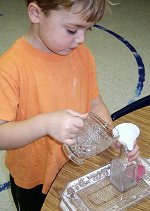 As a core feature of the Montessori programme, young children engage in meaningful real life activities such as Washing Tables, Polishing Brassware, Tying Shoes, Buttoning & Zippering, Sweeping Floors, etc., developing manual dexterity and muscular coordination, and making them more independent. Accomplishing tasks that grown-ups do, help to foster self-esteem and a sense of belonging.
As a core feature of the Montessori programme, young children engage in meaningful real life activities such as Washing Tables, Polishing Brassware, Tying Shoes, Buttoning & Zippering, Sweeping Floors, etc., developing manual dexterity and muscular coordination, and making them more independent. Accomplishing tasks that grown-ups do, help to foster self-esteem and a sense of belonging.
This also allows the child the opportunity for movement, where in traditional classrooms, they are expected to sit still even when they have not gained the necessary control for doing so. The happy balance of freedom to explore and work within a prepared, orderly environment, filled with mind-engaging sensorial materials and activities, is the hallmark of the Montessori learning environment.
The classroom is a non-competitive atmosphere that is designed to bring order to the daily impressions received by the child. There are opportunities for children to work independently, in small groups and the class as a whole. Ultimately, each child will feel satisfaction working at his or her own rate of progress.
The Montessori Method
- Sensorial Materials
- The Art of The Directress
- Practical Life
- Genuine Montessori





 [Click here for Hot Meals and Milk Order Form]
[Click here for Hot Meals and Milk Order Form]



